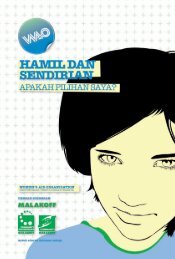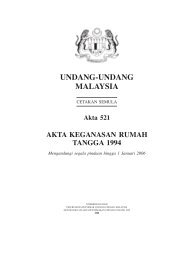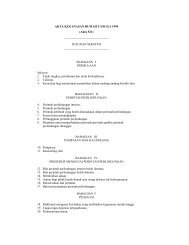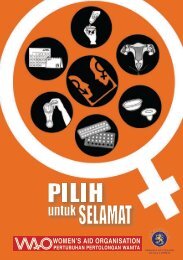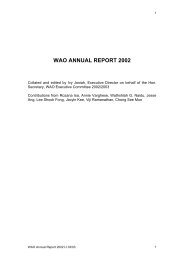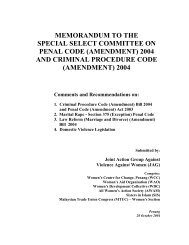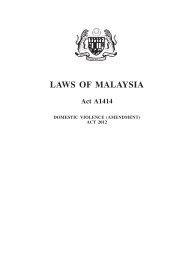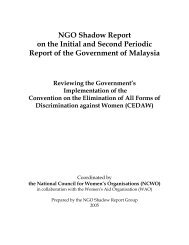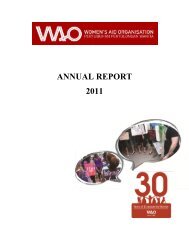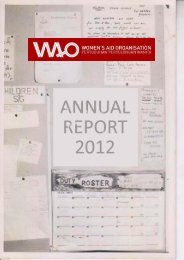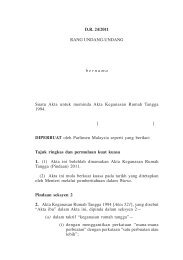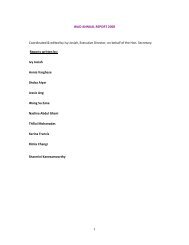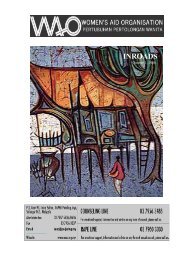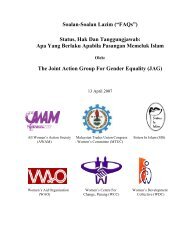WAO ANNUAL REPORT 2009 - Women's Aid Organisation
WAO ANNUAL REPORT 2009 - Women's Aid Organisation
WAO ANNUAL REPORT 2009 - Women's Aid Organisation
You also want an ePaper? Increase the reach of your titles
YUMPU automatically turns print PDFs into web optimized ePapers that Google loves.
own or with the assistance of friends. At least 22 had attempted to leave once and there were 9<br />
who had left home more than 5 times. Each time, the family members reconciled the spouses,<br />
or the woman’s husband came searching for her.<br />
Interestingly, 40% of the women said there was no real “reason” why they were abused; abusers<br />
just did it when they fancied doing so. About 90% felt their partners were jealous and suspected<br />
that the women were cheating on them, especially when the women refused to give in to the<br />
partners’ sexual desires or when they dressed attractively. The women felt these suspicions<br />
were unjustified as they were confined to either their homes or offices. The insults and<br />
vulgarities they were subjected to were just as bad as, or worse than, being physically violated.<br />
Many of the women just did not want to elaborate further, as their experiences were too<br />
painful, or beyond description.<br />
Police reports<br />
At the Refuge, the social workers attend to the residents as soon as they arrive, providing a<br />
listening ear first, enquiring how to assist them and then eventually informing them about the<br />
options such as making police reports, getting medical help and/or obtaining Interim Protection<br />
Orders (IPOs). This year 41 survivors of domestic violence had made police reports prior to<br />
coming to <strong>WAO</strong> and we only assisted 25 women to make police reports. As many as 17 women<br />
did not want to make police reports as they felt it was shameful to go to the police station, or<br />
they just wanted to be left alone.<br />
1.1.4 Migrant Domestic Workers (MDW)<br />
Once again, there was a lot of media coverage in the newspapers on “maid” abuse (e.g.<br />
http://www.mmail.com.my/content/maid-abuse-malaysia-shelter-full-horror-stories).<br />
At <strong>WAO</strong> we prefer to use the term “domestic worker” rather then “maid” as the former is rightsbased,<br />
and recognises the rights that a domestic worker should have, as an employee.<br />
The Indonesian Embassy now has a shelter within their compound and this has to some extent<br />
decreased the numbers of women needing our services. At our shelter there were 4 migrant<br />
domestic workers: 2 from Indonesia and 2 from Cambodia. They came to us through referrals<br />
from the police, embassies or members of the public. Most were between 20 to 39 years of<br />
age, although we had one young woman who was only 16 years old.<br />
All 4 women were abused by their employers and were dissatisfied with the payment of their<br />
wages.<br />
For three cases it took less than 2 weeks to help settle their issues, while the fourth case took 3<br />
months. The MDW either returned to their embassy (1) or to the agencies (1), or returned to<br />
their home country. One MDW went on to live independently in Kuala Lumpur.<br />
12



